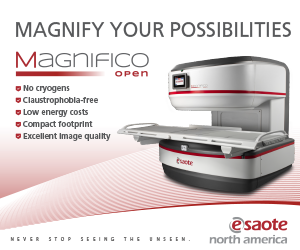|
E-Newsletter • September 2023 |
▼ ADVERTISEMENT

Editor's E-Note
Although radiologists are experts at qualitative imaging analysis, quantitative data can be highly useful in making diagnoses. Researchers at Hebrew University of Jerusalem, Tel Aviv Sourasky Medical Center, and Shaare Zedek Medical Center in Jerusalem have developed a quantitative MRI approach that measures iron levels in the brain. Iron imbalances play a critical role in brain function, aging, cancer, and neurodegenerative disorders, but measuring iron levels in the brain is a challenge. The new method, which does not require contrast media, may help physicians overcome this challenge.
Let us know on Twitter and/or Facebook how you like the newsletter.
— Dave Yeager, editor |
|
|
|
▼ ADVERTISEMENT
 |
What Is Your Brain's Iron Level? New Tech Can Find Out
A new MRI technology that noninvasively assesses iron levels in the human brain, shedding light on its critical role in brain function, aging, cancer, and neurodegenerative disorders, has been developed by researchers at the Hebrew University of Jerusalem (HU), Tel Aviv Sourasky Medical Center, and Shaare Zedek Medical Center (SZMC).
Iron balance, determined by the milieu of available iron compounds, is impaired in aging, neurodegenerative diseases, and cancer, the researchers wrote, but a noninvasive assessment of different molecular iron environments implicating brain tissue’s iron homeostasis remains a challenge. They say theirs is an innovative approach based on quantitative MRI. It distinguishes between healthy and pathological brain tissue without contrast agents and provides insights into iron-related disorders, offering a significant advancement in neuroscience and health care.
The research team was led by Shir Filo and Aviv Mezer of HU, together with Tal Shahar, director of the neurosurgical oncology unit at Sourasky’s neurosurgery department. The study, “Non-Invasive Assessment of Normal and Impaired Iron Homeostasis in the Brain,” was published in the journal Nature Communications.
The groundbreaking MRI technology promises to revolutionize scientists’ understanding of iron homeostasis in the human brain. Traditional MRI scans provide qualitative images that require subjective interpretation by medical professionals, while quantitative MRI seeks to replicate the precision of assessing body temperature accurately and objectively, moving beyond qualitative observations like “too hot” or “too cold.”
Maintaining the Balance of Iron
Achieving this requires intricate physical models that integrate multiple MRI scans to produce a diverse array of measurements. These MRI measurements are then leveraged to uncover valuable biological insights—similar to a blood test’s ability to reveal blood composition, including proteins, fats, and potential irregularities.
One critical aspect of brain function is maintaining the balance of iron, which is vital for overall health. Imbalances in the brain’s iron levels have implications for various conditions, including neurodegenerative diseases and cancer. Until recently, the noninvasive assessment of the molecular iron environment within the living human brain posed a significant challenge.
|
Simulated Blood Flow Reduces Adverse Outcomes in Angina Patients
A new kind of CT angiography utilizing AI is allowing radiologists to simulate blood flow and assess three-year clinical outcomes in patients with angina, according to a study published in Radiology.
Noninvasive MRI Detects Signs of Vascular Disease in Premature Infants
A team of researchers from Helmholtz Munich and the LMU University Hospital have developed a new, noninvasive MRI to detect early signs of vascular disease in premature infants. Catching the disease early can prevent complications later in life.
“Movie-Watching” fMRI Could Have Further Clinical Use
Researchers from Northwestern Polytechnical University revealed their “movie-watching” fMRI could be useful in detecting cognitive irregularities and amplifying cognitive prediction accuracy during disease research. |
“Our goal is to offer patients with nonsmall cell lung cancer more effective options, especially when other treatments may fall short. The fact that NC318, in combination with pembrolizumab, is well-tolerated in patients who had previously been treated with immune checkpoint inhibitors is encouraging.”
|
|
|
COVER STORY
Inside the Algorithm
Rather than asking how an AI algorithm works, it is in the best interest of radiologists to ask how often these algorithms work and assess the value they add to radiology departments.
FEATURE
Uncommon Insight
Radiologists are advocating to make radiomics a staple of their practices for its ability to help identify medical conditions sooner.
|
|
|
| Advertising Opportunities |
Have a product or service you want to market to radiology professionals? Utilize the reach of Radiology Today Magazine to accomplish your marketing goals. Email our experienced account executives today at sales@gvpub.com or call 800-278-4400 for more information.
|
| © 2023 Radiology Today Magazine |
|
|